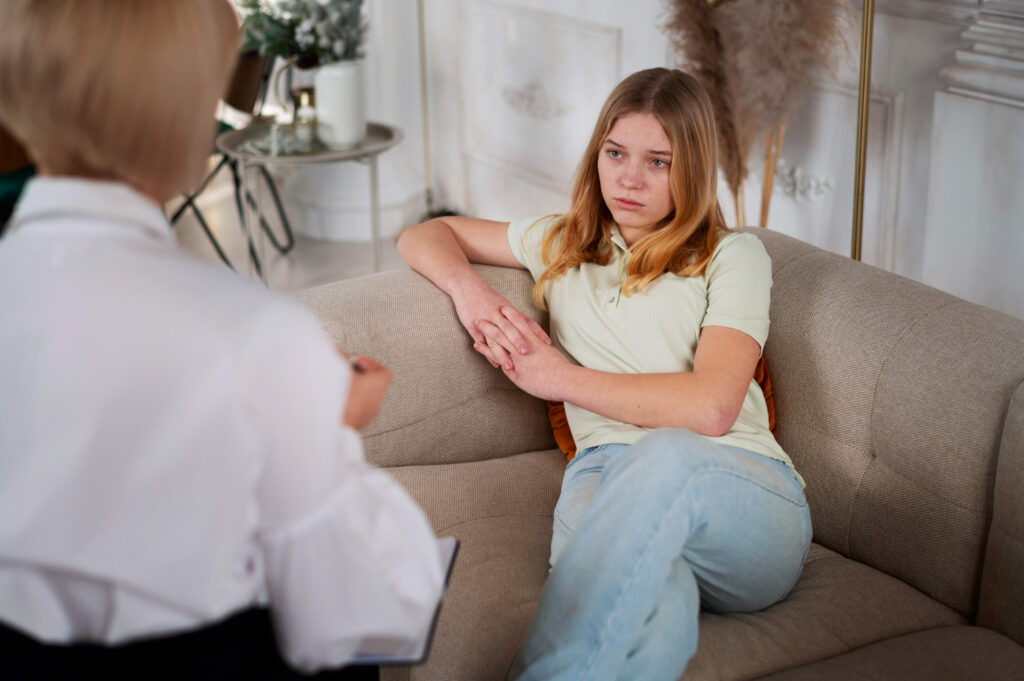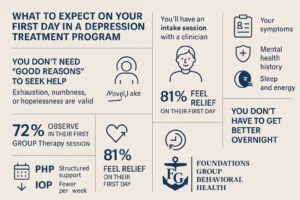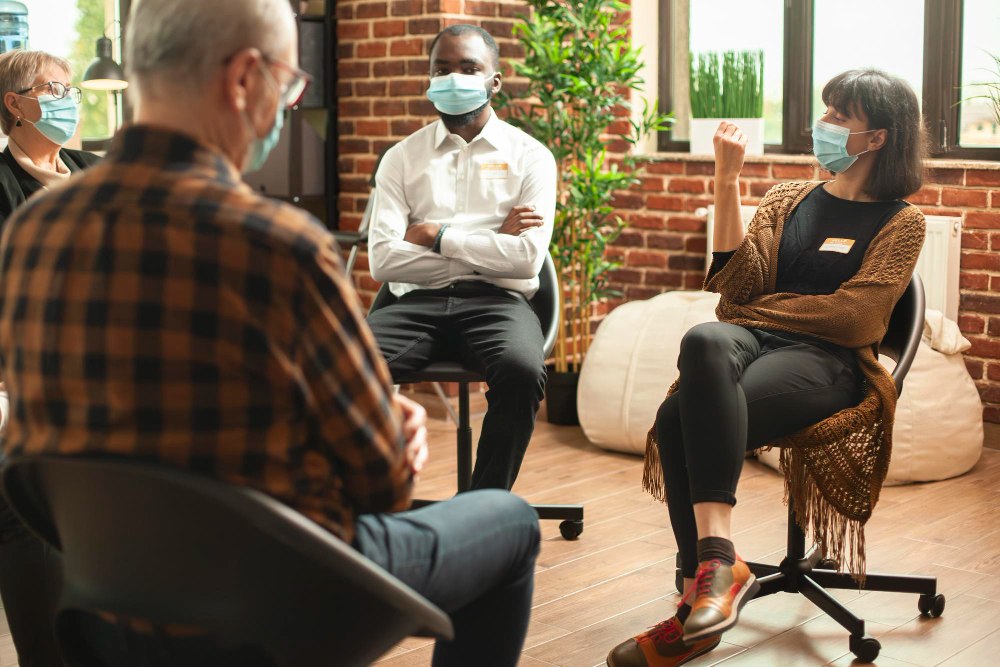Starting a depression treatment program doesn’t feel like a milestone. It feels like a maybe. A quiet moment where something in you whispers, “Try this. Just try.”
You’re not alone in feeling unsure, scared, or even skeptical. For many people in Cape Cod and across Massachusetts, walking into treatment for the first time feels like both a risk and a relief. But that day—day one—isn’t about proving anything. It’s about letting someone else help carry what’s been too heavy for too long.
As a clinician who meets people on their first day every week, here’s what I want you to know: You’re not doing it wrong. However you show up is valid. And yes, we’re ready for you.
You Don’t Need to Have “Good Reasons” to Be Here
One of the first things people ask is, “Do I even belong here?” They often follow it up with:
- “I haven’t been hospitalized…”
- “It’s not like I can’t function…”
- “Other people have it worse…”
Let’s be clear: Depression doesn’t need to reach crisis levels to deserve care. Exhaustion, numbness, hopelessness, or the slow fade of joy from your life—those are valid reasons to seek help. And they’re often the ones that bring people through our doors in Barnstable County, MA every week.
If you’re hurting, you belong. That’s it.
What Happens When You Arrive
You’ll be greeted by staff—quietly, warmly. No big announcements. No pressure to “get into your story.” You’ll check in, get oriented, and meet with a clinician. That’s often me or someone on my team. This is called your intake session.
Here’s what to expect during intake:
- We ask about your symptoms—how you’ve been feeling day to day.
- We learn about any history of mental health support or diagnoses.
- We check in gently about safety, including thoughts of self-harm or suicide.
- We ask about sleep, energy, appetite, focus—how your body is coping.
- If you’ve tried medications or therapy before, we talk about what helped and what didn’t.
We’re not looking for the perfect story. We’re just listening for what hurts, so we can build something that actually helps.
We Talk Through What Comes Next
After intake, we’ll walk you through your program. Most people begin in one of two ways:
- PHP (Partial Hospitalization Program): Structured weekday support, often 5–6 hours per day.
- IOP (Intensive Outpatient Program): Fewer hours per week, often a step-down or flexible starting point.
If you’re exploring treatment in Falmouth, MA, we’ll help you choose the right fit for your life and needs.
You’ll get a printed schedule, a tour of the space (virtual or in-person), and an orientation guide. Expect to learn about:
- Group therapy structure
- Individual sessions
- Psychiatry/medication options
- Wellness or experiential therapies
- Safety procedures and privacy rights
Orientation isn’t rushed. You can ask questions. Or not. You can cry. Or not. There’s no right way to begin—just that you do.
What Your First Group Therapy Session Is Like
This might be the most intimidating part for new clients—and that makes total sense. Group therapy can feel deeply vulnerable. But you won’t be put on the spot or asked to share more than you’re ready for.
On day one, you’ll mostly observe. You might be invited to introduce yourself—but you can always say, “I’m just here to listen today.” That’s enough.
Group therapy topics might include:
- Coping with self-criticism and shame
- Understanding depressive thinking patterns
- Learning how to sit with hard emotions without numbing
- Practicing communication or boundary-setting
Most people leave their first group surprised. Not because it’s easy, but because it feels… human. There’s laughter. There’s quiet. And there’s realness.
The Emotional Whiplash Is Real—and Normal
You may leave your first day feeling three things at once:
- Relief (“I actually did it.”)
- Overwhelm (“That was a lot.”)
- Doubt (“What if this doesn’t help?”)
That’s all normal. You’re coming out of survival mode. It takes time to trust that you’re safe here. We don’t need you to believe 100% in the process yet—we just ask that you keep showing up long enough to find out.
Depression Looks Different on Everyone. So Does Recovery.
Some clients are high-functioning professionals. Others haven’t worked in months. Some are parents. Some are students. Some are both. There’s no one way to “look depressed.” You might be deeply sad or completely numb. You might cry easily—or haven’t cried in years.
Our depression treatment program in Cape Cod, MA is designed to meet you wherever you are on that spectrum. Treatment isn’t a factory—it’s a path we walk together, one day at a time.
You’re Not Expected to “Get Better” Overnight
We’re not looking for quick fixes or false cheer. The first week is about building stability and connection. Medications (if prescribed) take time. Trust takes time. Your body and mind need time.
You are not behind. You are not failing. You are in progress.
Quick Tip: How to Prepare for Your First Day
You don’t need much—but these small things can help you feel a bit more grounded:
What to Bring:
- Comfortable clothes
- A notebook or journal
- Water bottle
- Any medications (or a list)
- Insurance info if needed
You don’t need to “study” for treatment. You just need to be real.
Common Questions About Starting a Depression Treatment Program
Will I be forced to talk about things I’m not ready to?
No. You are always in control of what you share. Participation is encouraged, not forced.
Is this like a hospital?
No. Programs like PHP and IOP are outpatient. You go home each day. The environment is structured but not clinical—more like a calm community space.
What if I start crying and can’t stop?
That’s more common than you think. And it’s okay. Staff are trained to support you gently, without pressure or embarrassment.
Can I still work or take care of my family?
IOP can be flexible enough to accommodate part-time work or caregiving. PHP is more time-intensive but may be worth taking leave for, short-term. We’ll help you plan.
What if I don’t like it or it doesn’t help?
We’ll check in regularly about your experience and adjust your treatment plan if needed. Sometimes the first step just opens the door to other kinds of help.
What You Might Feel After Day One
By the time you head home, you may feel tired. Emotionally spent. Or quiet. But under that, you might also feel something else: stabilized. Not because everything is fixed—but because for the first time in a while, someone else knows. Someone else is holding a corner of this with you.
That matters more than most people realize.
Looking for a Depression Treatment Program in Barnstable County?
If you’re reading this from anywhere in Cape Cod, including Falmouth, MA, our team is here. Whether you need intensive support through PHP or a more flexible option like IOP, our depression treatment program in Cape Cod is built to help you feel less alone—and more like yourself again.
Call 888-685-9730 to learn more about our depression treatment program services in Cape Cod, MA. We’re ready when you are.









